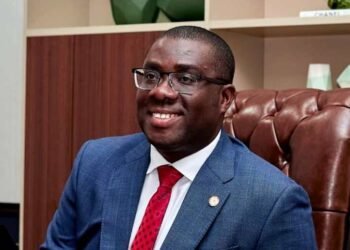A Senior Research Fellow at the Institute of Fiscal Studies (IFS) has warned that the projected 5% GDP growth may not materialize if the government does not resolve the power issues. According to Dr. Said Boakye, a constant electricity supply is very key in the country’s quest to recover fully from the damages of the pandemic.
“Growth rate was projected at 0.9% in 2020. And it is hoped that in 2021, growth will pick up to 5%. If you are not able to get your electricity supply in order, you will not be able to achieve that. Growth is not just mere growth; it has something to do with employment”.
The Ghana Grid Company Limited (GRIDCo), has earlier hinted of an impending load-shedding timetable for power outages in some parts of the country. Some areas of the Greater Accra, Central and Ashanti regions would experience power outages as a result. These areas will experience power cuts between April and June this year.
Meanwhile, the Corporate Communications Manager of GRIDCo, explained that the rationale is to complete work on some transmission lines and bulk supply points. This, according to Mr. Ebenezer Amankwaah will reduce the burden on the existing electricity substations.

Critical role played by power
However, Dr. Said told the Vaultz News that once there is a cut in power supply, businesses may not be able to operate as they should. This, according to him, may affect employment and derail the gains that the government has made so far in rebuilding the economy. He pointed out that the power crises in 2013 and 2014 had a severe impact on the country’s growth rate in those years.
“You will realize that in 2013/2014 when the country was experiencing this, the growth rate was so low; the lowest since the country entered the fourth republic. This was partly due to this electricity supply”.
Dr. Said highlighted the critical role played by electricity in the country’s developmental agenda. He explained that, any challenges with electricity supply affect industry and service delivery. According to him, when there are shortages in electricity supply, it has a significant impact on several activities in the country.
“Generally, electricity is very critical for production including service delivery”.
Moreover, Dr. Said noted that, based on the government’s assertions, the recent power outages are not as serious as those experienced in the previous years. Nevertheless, he pointed out that his comment is based on the assumption that the government is not withholding information on the true state of the challenge.

He indicated that some energy analysts hint that the situation is much more difficult than the government is saying. According to him, what that implies is that there are so much equipment that are not functioning well.
“But the government is saying that it’s just limited maintenance they are doing. However limited it may be, it will still have an impact on economic activity”.
Mitigating the impacts of power outages
Furthermore, Dr. Said suggested some measures government can put in place to minimize the impact of the power shortages on businesses. According to him, there is a need for the government to ensure that the machines are always functioning properly. He indicated that the government must be proactive, instead of waiting for the equipment to deteriorate before it acts.
“We know that machines need to be maintained. If you always do that, then you will be able to continuously supply electricity”.
Moreover, Dr. Said called for a continuous rather than periodic maintenance of electricity-generating machines and equipment. This, he indicated, will help government discover possible challenges and plan to save the country a lot of resources. Additionally, it will reduce the hurdles businesses will have to go through to purchase generators.
He, however, bemoaned the fact that continuous maintenance will also require the availability of funds. Yet, he noted that the country is not able to raise enough revenues because there are so many leakages in the system. As such, funds are normally not available to ensure continuous maintenance of the equipment.
“Revenue leakages especially with regards to the electricity sector is enormous, we are told. They have to be as efficient as possible in collecting revenues. This will help them to continuously maintain their equipment so that we can have full power supply”.
Recent power outages
Recently, there are intermittent power outages, especially in the capital city. However, energy service providers such as GRIDCo and ECG attribute the outages to technical challenges on transmission lines and network substations.
Energy experts say the country loses billions of dollars to deteriorating existing infrastructure in the energy sector. The Executive Director of Africa Centre for Energy Policy, Benjamin Boakye, estimated that the country loses about $2.5m per month. However, reports indicated that only 28% of the 944 megawatts capacity banks across the nation were functional in 2020.
READ ALSO: TIN replacement won’t result in domestic revenue growth- Timore Boi




















